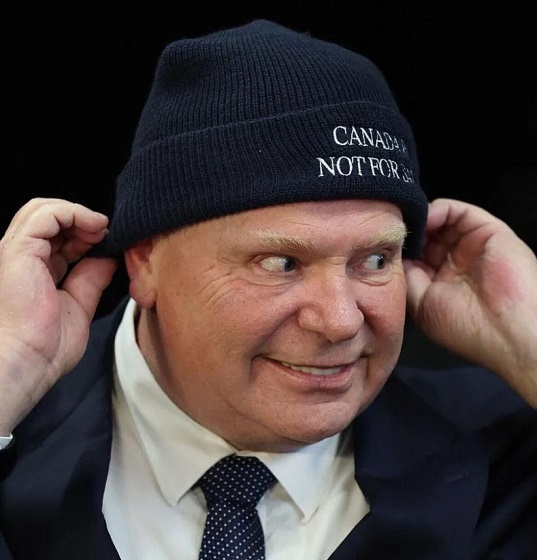Dan McTeague
The Carbon Tax is part of a bigger plan to change the way you live

From Canadians for Affordable Energy
 Written By Dan McTeague
Written By Dan McTeague
On April 1, the carbon tax is going to rise from $65 per tonne to $80 per tonne, and it seems Canadians are noticing this jump more than those of the past few years.
Back in 2019, the Trudeau government announced its 566% carbon tax hike, starting at $15 per tonne and increasing yearly until 2030, when it would reach a staggering $170 per tonne. It received some attention at the time, but there was not a great deal of pushback. Presumably the numbers were too abstract to catch people’s attention and 2030 seemed a long way off.
But today things are different. It helps that Conservative Party leader Pierre Poilievre has been campaigning aggressively against the tax, with rallies and petitions to ‘Axe the Tax.’
Even Liberal premiers, such as Andrew Furey of Newfoundland and Labrador, have been pleading with Justin Trudeau to hit pause on the increase. In fact, a total of seven premiers in the country have spoken out against the tax, asking for a delay in its increase.
That’s because they recognize the tax is hurting Canadians. The cost of everything has gone up. It’s gotten so tough for businesses that some restaurants have begun adding a ‘carbon tax’ line item to the final bill. And if Canadians think it is bad now, wait until 2030 when the carbon tax will more than double its current rate.
The other reason people are more aware of the increase is because, well, the tax is working. It’s doing what it was designed to do, though maybe not in the way you might think. The goal is not simply to reduce emissions — in fact emissions have gone up. The goal is actually more nefarious than that. Let me explain.
The carbon tax is one of the pillars of the United Nations, World Economic Forum (WEF) Net-Zero-by 2050 agenda. In order to achieve their objective, they need all of us to fundamentally alter the way we live our daily lives. They want us to drive less, fly less, eat less meat (and more bugs). The carbon tax is a punitive means of achieving this.
In fact, the Trudeau government’s own Healthy Climate, Healthy Economy plan articulates the logic of the tax quite well when it says, “The principle is straightforward: a carbon price establishes how much businesses and households need to pay for their pollution. The higher the price, the greater the incentive to pollute less, conserve energy and invest in low-carbon solutions.”
It’s worth noting that they’re using a pretty loose definition of ‘pollution’ here, because we all know that carbon dioxide is not a pollutant — it is a gas which makes life on earth possible.
Even so, their intention is clearly stated — they figure that, if the price of fuelling up your car, going on a vacation and heating your home gets high enough, you will have to drastically alter the way you live your day-to-day life.
You will stop flying, cut back on driving, use fewer appliances. And really, you’ll just get used to having less money, until — following the slippery slope to its conclusion — you will “own nothing and be happy,” in the words of that infamous WEF tweet.
Which is to say, the carbon tax is a punishment for participating in normal economic activity, for living a regular life. Of course, for the time being you can catch a break if you live in Atlantic Canada and heat your home with oil, but if you live in the prairies and heat your home with natural gas, sorry, but you’re out of luck. You aren’t in a Liberal riding, after all!
And even then, the Liberals and their activist friends are banking on Canadians reducing their carbon emissions in order to achieve their Net Zero 2050 target.
So good for Pierre Poilievre, Andrew Furey and the other premiers for pushing back on the carbon tax.
But let’s not forget that, as noxious as it is, it’s only one small part of the Liberals’ Net Zero agenda.
Eliminating the carbon tax is merely cutting off one head of the hydra. If Canada’s political leaders are really concerned with affordability, then they need to target the monster’s heart.
It’s time that we not only axe the tax, but we need to scrap Net Zero.
Dan McTeague is President of Canadians for Affordable Energy
Automotive
Canada’s EV experiment has FAILED

By Dan McTeague
The government’s attempt to force Canadians to buy EVs by gambling away billions of tax dollars and imposing an EV mandate has been an abject failure.
GM and Stellantis are the latest companies to back track on their EV plans in Canada despite receiving billions in handouts from Canadian taxpayers.
Dan McTeague explains in his latest video.
Automotive
Canada’s EV subsidies are wracking up billions in losses for taxpayers, and not just in the auto industry

By Dan McTeague
To anyone who thought that the Liberals’ decision to postpone enforcement of their Electric Vehicle (EV) mandate by one year was part of a well-thought-out plan to get that disastrous program back on track, well, every day brings with it news that you were wrong. In fact, the whole project seems to be coming apart at the seams.
Here’s the latest crisis Mark Carney and his carnival of ideologues are having to deal with. Late last year, the Liberal party instituted a 100% tariff on Chinese-made EVs. The idea was to protect the Canadian EV industry from China dumping their vehicles into our country, at prices far lower than Canadian companies can afford due to their massive state subsidies. This has been a major problem in the EU, which is also attempting to force a transition to EVs.
But Beijing wasn’t going to take that lying down. Taking advantage of Western environmentalist sentiment is an important part of their economic plans — see, for instance, how they’ve cornered the global solar panel market, though the factories making them are powered by massive amounts of coal. So they retaliated with a 75% duty on Canadian canola seed and a 100% tariff on canola oil and canola meal.
This was big enough to really hurt Canadian farmers, and Ottawa was forced to respond with more than $300 million in new relief programs for canola producers. Even so, our farmers have warned that short-term relief from the government will do little if the tariffs are here for the long-term.
With pressure on Carney mounting, his Industry Minister Melanie Joly announced that the government was “looking at” dropping tariffs on Chinese EVs in the hope that China would ease off on their canola tariffs.
That may be good news for canola producers, but how about the automotive companies? They’ve grown increasingly unhappy with the EV mandate, as Canadian consumers have been slow to embrace them, and they’ve been confronted with the prospect of paying significant fines unless they raise prices on the gas-and-diesel driven vehicles which consumers actually want to make the EVs that they don’t really want more attractive.
That’s the context for Brian Kingston, CEO of the Canadian Vehicle Manufacturers’ Association, saying that dropping these tariffs “would be a disaster.”
“China has engaged in state-supported industrial policy to create massive overcapacity in EV production, and that plan is coming to fruition now,” Kingston said. “When you combine that with weak labour and environmental standards, Chinese manufacturers are not competing with Canadian, American, or Mexican manufacturers on a level playing field. We simply cannot allow those vehicles to be dumped into the Canadian market.”
The auto manufacturers Kingston represents are understandably upset about suddenly having to compete with underpriced Chinese EVs. After all, with the government forcing everyone to buy a product they really don’t want, are most people going to patriotically pay more for that product, or will they just grab whichever one is cheaper? I know which one I think is more likely.
And then there’s a related problem — the federal and provincial governments have “invested” somewhere in the neighborhood of $52.5 billion to make Canada a cog in the global EV supply chain. In response to Joly’s announcement, Ontario Premier Doug Ford, who has gone “all in” on EVs, wrote an open letter to the prime minister saying that canceling the tariffs would mean losing out on that “investment,” and put 157,000 Canadian automotive jobs at risk.
Now, it’s worth noting that automakers all over Ontario have already been cutting jobs while scaling back their EV pledges. So even with the tariffs, this “investment” hasn’t been paying out particularly well. Keeping them in place just to save Doug Ford’s bacon seems like the worst of all options.
But it seems to me that the key to untangling this whole mess has been the option I’ve been advocating from the beginning: repeal the EV mandate. That makes Canada less of a mark for China. It benefits the taxpayers by not incentivizing our provincial and federal governments to throw good money after bad, attempting to subsidize companies to protect a shrinking number of EV manufacturing jobs.
The heart of this trade war is an entirely artificial demand for EVs. Removing the mandate from the equation would lower the stakes.
In the end, the best policy is to trust Canadians to make their own decisions. Let the market decide.
Support Dan’s Work to Keep Canadian Energy Affordable!
Canadians for Affordable Energy is run by Dan McTeague, former MP and founder of Gas Wizard. We stand up and fight for more affordable energy.
-

 Environment2 days ago
Environment2 days agoThe era of Climate Change Alarmism is over
-

 Crime1 day ago
Crime1 day agoPublic Execution of Anti-Cartel Mayor in Michoacán Prompts U.S. Offer to Intervene Against Cartels
-

 Business2 days ago
Business2 days agoMystery cloaks Doug Ford’s funding of media through Ontario advertising subsidy
-

 Aristotle Foundation1 day ago
Aristotle Foundation1 day agoB.C. government laid groundwork for turning private property into Aboriginal land
-

 Justice1 day ago
Justice1 day agoA Justice System That Hates Punishment Can’t Protect the Innocent
-

 Daily Caller22 hours ago
Daily Caller22 hours agoNigeria Would Welcome US Intervention In Massacre Of Christians By Islamic Terror Groups
-

 Business1 day ago
Business1 day agoCarney government should retire misleading ‘G7’ talking point on economic growth
-

 Automotive22 hours ago
Automotive22 hours agoCanada’s EV experiment has FAILED








